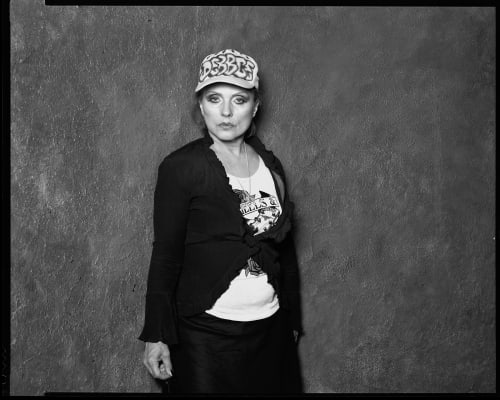The Chelsea Hotel is legendary for generations of bohemian habitués, from the Dylan Thomas and Burroughs and the Beats scene of the 1950s through the 1960s Warhol superstars and late-‘70s and early-‘80s queer art and punk scenes. Nico immortalized the place in her eternal ode, Chelsea Girl; Stormé DeLarverie and Candy Darling spent much of their lives there; and Sid Vicious (allegedly) murdered his wife Nancy Spungen there.
Its story doesn’t end in the 20th century—and hopefully its home as an incubator of counterculture will live on despite its conversion into a luxury hotel—as proven by a fabulous new show at ACA Galleries. “Chelsea Hotel Portraits” picks a few dozen from the 1,500 photographs Tony Notarberardino has taken over the past 25 years with his vintage 1960s Toyo-View 810GII camera. “It’s actually the first time I’m seeing a lot of them blown up to life size,” he tells Surface, “so I’m kind of seeing them for the first time in a way—it’s quite thrilling.”
Viewers will thrill to some of the characters on display, including Grace Jones, Amanda Lepore, Dee Dee Ramone peacocking his own chest tattoos, and a glamorously nonplussed Debbie Harry in a trucker hat with her own name on it. Notarberardino photographed each of his subjects in his own hallway at the Chelsea. “Not only did I have to convince them to get their photo taken, but I had to convince them to come to my hotel room—that was the hard part,” he notes.“Being invited to someone’s hotel room—especially at 2 or 3 in the morning—was sort of dodgy. It took me a long time to get the confidence to approach them, and for them to get to know me before agreeing to get their photograph taken.”
Notarberardino says it took a decade to win some of them over: “You need to wield a certain kind of magic to make it happen.” Refreshingly, he wielded it not only to convince the freaks and the stars, but the hotel staff and other workers whose labor made everyone’s magic possible. His photographs eschew mythmaking; they take the subjects on their own terms with a minimalist framing allowing for maximum empathy. “[This project has] always been about the people of the Chelsea, regardless of how famous they are,” he says. “I find a picture of the trash man as important as the picture of Grace Jones. To me, it’s like a portrait of a person, not so much what they do, or who they are, or their status or fame.”


